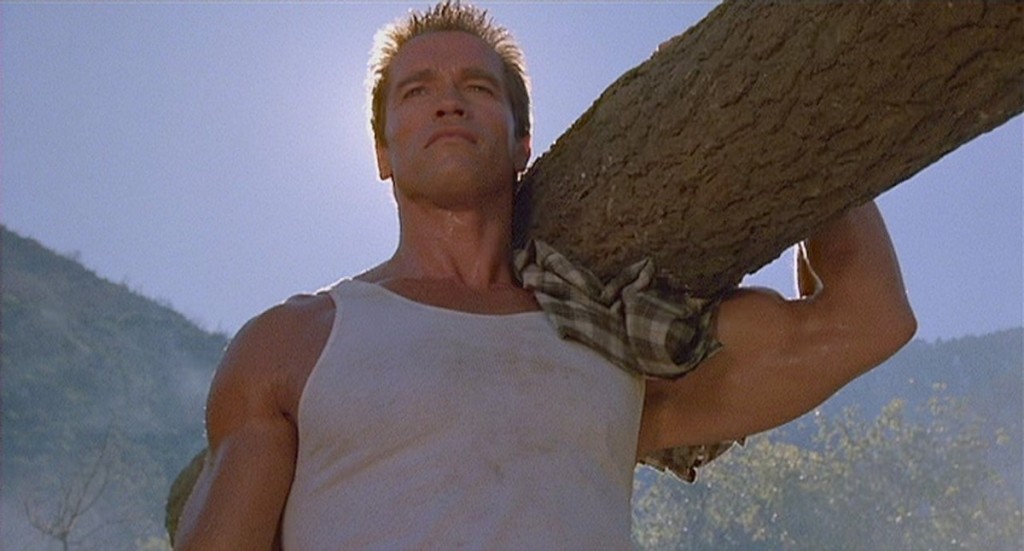A perfect engine of meaningless destruction, “Commando” followed Arnold Schwarzenegger’s breakthrough hit “The Terminator” by less than a year. Even though he played a villain in the latter, he imported his signature moves and performance tics into the role of a stoic meat-slab trying to save his daughter from Latin American death squads and their mercenaries. I’m the right age to have seen all of the now-nearly-canonized 1980s R-rated adventures (including this one, the Rambo pictures, “Aliens,” “Predator” and “Die Hard“) in first-run theaters. As a historical witness (cue Civil War fiddle music—or maybe Horner’s turtle drums) I can testify that yes, “Commando” was a big deal—not just because it was continuously violent (hundreds of killings) and mordantly funny (“I lied”), but because any viewer with eyes could see that Schwarzenegger was already putting his own distinctive spin on the persona he’d created with James Cameron. From the instant that Arnie made his entrance in “Commando,” clomping through a forest with a chainsaw in his right hand and a giant log on his oiled left bicep, you knew you were watching a film that was in on its own joke—and in case you weren’t convinced, the film had its hero row to the final showdown in a Speedo. There are jokes in the script about red meat and macho b.s., but they’re mainly in there so the film can wallow in the things it decries. “Commando” might be the first entirely postmodern action thriller, serving up many of the cliches that audiences saw in “Rambo, First Blood Part II” four months earlier (including close-ups of a glistening muscleman strapping on weapons) but putting a half-mocking spin on them. As a man sitting in front of me shrieked delightedly to his date, right after Vernon Wells’ burly henchman Bennett got electrocuted on a fence and it only made him madder, “It’s a motherf—–g cartoon!”
I recall reading an interview with Schwarzenegger in my local newspaper circa 1985 where he said something along the lines of, “Young audiences now don’t just want their good guys to be good, they also want them to be bad.” Bad, as in badass. Or bad as in bad boy, verging on bully—like Clint Eastwood, an actor whose films Schwarzenegger had obviously studied, as if they were How-To manual for actors who had broad shoulders and a square jaw but not a lot of range. Schwarzenegger’s predatory squint comes from Eastwood. So does his sneering delivery of kiss-off lines and his willingness to play characters so adept at killing that they seem more like John Carpenter horror movie stalker-creatures than traditional leading men. (Both Schwarzenegger and Eastwood have played many characters who get killed, in body or spirit, and then resurrected so that they can deal out death and snotty one-liners.) There was a tendency at the time to ascribe Schwarzenegger’s fondness for cheeseball bon mots like “Don’t disturb my friend, he’s dead tired” and “Let off some steam” to a desire to imitate Bond (he would get his chance, sort of, in 1994’s “True Lies“), but the self-satisfied quality is more Clint. When Schwarzenegger’s Matrix tells David Patrick Kelly’s Sully as he’s hanging him off a cliff that “this is my weak arm,” or quips upon leaving the hotel room where he killed Bill Duke’s Green Beret that they’re taking his car because “he won’t be needing it,” he’s just being a jerk.
But he’s a funny jerk—and the film’s and Schwarzenegger’s deadpans are so expertly judged that you don’t tire of Matrix’s “wit,” much less disapprove of it. Tone is everything. “Commando” is as knowingly unreal as some of the best 1980s Hong Kong action classics. Like those films, this one is essentially a comedy with a body count; the bit where Matrix swings across a shopping mall atrium like Tarzan might be an homage to the most famous stunt in Jackie Chan’s “Police Story.” “Die Hard” cowriter Steven E. De Souza and “Class of 1984” director Mark Lester have a knack for setting up preposterous sight gags and
groan-worthy jokes, then cutting away from them so quickly that you
can’t help but laugh. When Matrix and Rae Dawn Chong’s intrepid flight attendant Cindy crash a car into a telephone pole,
Lester quickly cuts to a tighter shot of Matrix asking, “Are
you all right?”, and of course she is.
This is the kind of movie where the hero realizes the bad guys have torn the cables out of
his truck to prevent him from chasing them to rescue his daughter and puts the damned thing in neutral and drives it downhill, somehow dodging every tree; when he finally crashes and
the truck obligatorily explodes, the movie cuts to Matrix sprinting away from the wreck. There are a lot of moments like those in “Commando”—moments where the film seems to have a crush on
its own ludicrousness and is determined to keep the buzz going by never
allowing the audience to look (or think) long enough to poke holes. Roger Ebert was fond of calling out this kind of Saturday
morning serial logic (affectionately): Hopalong Cassidy appears to get
buried in an avalanche at the end of a chapter, and at the start of the
next one you see him riding along in the desert while the
announcer says, “After Hoppy escaped from the canyon…”
Schwarzenegger’s brawn is used for slapstick effect throughout. He’s the Terminator as single dad. Abetted by Cindy, he charges through Southern California with an improbable blend of lethal grace and thunder-footed clumsiness. At times his whole performance seems modeled on the scene in “It’s a Mad, Mad, Mad, Mad World” where Jonathan Winters destroys a gas station with his bare hands. Matrix rips through a partition in the cargo hold of a plane, kicks and punches enemies so hard that they crash through walls, snaps a man’s neck with his bare hands as if it were a shingle, and rips a seat out of Cindy’s convertible for no discernible reason (it can’t be to hide from Sully; in long shots of the vehicle, Matrix’s head is sticking up right next to Cindy’s, like a dog enjoying the feel of highway wind in his mouth). He just crashes through the world, punching and kicking and shooting and incinerating everything and everyone that stands in his way, until he finally javelins a pipe through Bennett and wraps his redwood arms around his daughter again and they fly away with Cindy.
Are we supposed to think that Matrix, Jenny and Cindy form a makeshift nuclear family in the end? It’s hard to say, because this is a rare ’80s action flick that doesn’t twist the script’s only significant male-female relationship (unless you count a couple surprised mid-coitus when soldiers crash through their motel room wall) into a love story. But at the same time, “Commando” treats the leads’ very real chemistry as a comic resource that’s ultimately as important as the film’s explosions and prosthetic flourishes (like that buzz saw flattop that the hero gives a goon in the toolshed scene). That Matrix and Cindy’s relationship is so instantly comfortable adds to its humor. They get along as if they’ve known each other for years. She busts his chops and freaks out sometimes but always comes through in a pinch (she even figures out how to fire a rocket launcher by reading the instructions), and Matrix never loses his cool with her. He treats Cindy as if she’s the latest addition to his unit, somebody who’s green but will get the hang of things eventually.
There’s an arc here; who’d have thunk it? Before Matrix met Cindy, she was a flight attendant who couldn’t get a date, now she’s helping a commando rescue his daughter by flying a hijacked seaplane to an island stronghold. One of the many fun ways to think about this film after-the-fact is to envision it a chaste romantic comedy titled “When Matrix Met Cindy,” about the most exciting twelve hours in a woman’s life. Even if the two don’t end up married after the final credits fade, I bet they keep in touch. Maybe Cindy attends Jenny’s high school graduation and gives her a card with a drawing of a seaplane on it.












